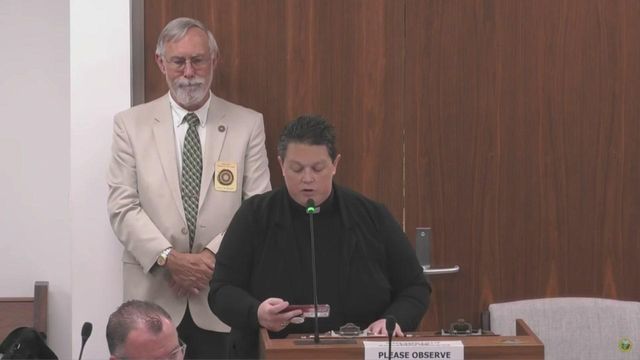Black voters sue to strike down NC Senate map, saying it's racially gerrymandered
The first of what's expected to be multiple lawsuits challenging North Carolina's new voting districts was filed Monday, alleging that the new state Senate map discriminates against Black voters.
"Despite having ample evidence of racially polarized voting and a history of discrimination in the ‘Black Belt counties’ of northeastern North Carolina, and an obligation under the Voting Rights Act to analyze that evidence before drawing districts, the North Carolina General Assembly adopted a Senate plan that unlawfully deprives Black voters of the opportunity to elect candidates of their choice," the lawsuit says.
New voting maps for all of the state’s legislative and Congressional districts were redrawn this year because the previous maps, drawn in 2021, were thrown out last year as unconstitutionally gerrymandered.
A spokesman for the State Board of Elections, whose leaders are named in the lawsuit, said the board plans to respond in court rather than the media. Senate Republican leadership didn't immediately respond to requests for comment.
Republican leaders repeatedly said they didn't use racial data when drawing the new maps this year, adding that they therefore couldn't have discriminated against Black voters. The lawsuit is not a surprise, however. Democratic lawmakers alleged repeatedly during the redistricting process that the new maps were racially gerrymandered, and on Monday they celebrated the lawsuit.
"During the latest round of redistricting, Senate Democrats made repeated attempts to warn our Republican colleagues of the blatant racial gerrymandering incorporated in their plan," Sen. Dan Blue, D-Wake, said in a news release Monday. "We provided multiple alternative maps to the Republican majority which would have complied with the Voting Rights Act and protected the constitutional rights of all North Carolinians. Unfortunately, they rejected simple fixes and decided to roll the dice hoping the courts wouldn’t have time to intervene before the 2024 election."
The maps, approved last month in a vote sharply divided along party lines at the state legislature, are expected to give Republicans a majority in the state legislature, even if Democrats win a majority of the statewide vote. The new voting lines for the state's 14 U.S. House of Representatives districts are expected to similarly give Republicans at least 10 of the 14 seats in future elections, even if most voters vote for Democrats.
Monday's lawsuit doesn't challenge the congressional lines, nor the state House districts. It only targets the state Senate map. In particular it focuses on the rural northeastern part of North Carolina, where a dozen or so counties have substantially higher-than-average Black populations, including five — Bertie, Hertford, Edgecombe, Northampton, and Halifax — where most residents are Black. The new maps split up those counties between multiple Senate districts, the lawsuit alleges, in order to dilute Black voters' influence by pairing those counties with conservative, white-dominated counties instead.
Part of proving racial discrimination in the Senate map will require proving that voting in North Carolina is still racially polarized — in other words, that white voters will tend to block the candidates preferred by Black voters. Some Democratic leaders have conceded in recent years that that's not as much of a problem in urban areas now as it used to be, but that racially polarized voting is still prevalent in more rural parts of the state.
The lawsuit cites a court ruling from a 2016 case — when Republicans lost an effort to overhaul voting rules — in which the court wrote that the legislature’s racially discriminatory intent in that case was just another part of a “long history of race discrimination generally and race-based vote suppression in particular.” The gerrymandering lawsuit then goes on to list GOP campaign ads and candidate statements, from the 1980s through as recently as 2020 and 2022, as evidence of thinly veiled race-baiting.
“Political campaigns in North Carolina have continued to be characterized by overt or subtle racial appeals, including discriminatory campaign tactics and racial appeals in elections deliberately and demonstrably designed to keep Black North Carolinians from registering and turning out to vote,” the lawsuit says.









